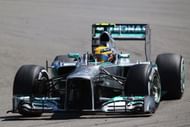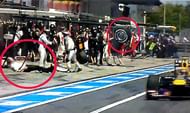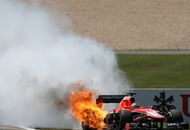Sebastian Vettel of Red Bull Racing celebrates on the podium after winning the German Grand Prix at the Nurburgring on July 7, 2013 in Nurburg, Germany. (Getty Images)
Going in to the German Grand Prix at the Nurburgring, things did not bode well for reigning world drivers champion and current world drivers’ championship leader, Sebastian Vettel. The German had retired from the lead at last week’s British Grand Prix after suffering a gearbox failure and had never won a single F1 race in the month of July.
The Red Bull driver had also never won his home Grand Prix, and after looking so strong in Saturday morning free practice, he found himself beaten to pole position by Mercedes driver Lewis Hamilton, the man who won the last German Grand Prix at this track in 2011.
If all of these factors were weighing on Vettel’s shoulders you would never have guessed it from watching the race. The German got a great start and jumped ahead of Hamilton into the lead of the race and never really looked back.
He was unable to streak clear of the field – the hallmark of so many of his past race victories – and he had to relinquish the lead as different tyre tactics came into play, but he drove a very controlled race.
He came under pressure, from the Lotus cars of Kimi Raikkonen and Romain Grosjean, in the latter part of the race but he was never actually challenged for the lead.
Vettel was perhaps helped by the fact that the expected strong challenge from Mercedes never materialised. Hopes were high for the Brackley based team after a strong performance at the British Grand Prix, followed up by a stunning qualifying performance from Hamilton at the Nurburgring on Saturday.
However, despite that pole position, Mercedes also erred on Saturday, misjudging the extent to which the track would improve resulting in Nico Rosberg being unceremoniously dumped out of Q2 while he sat in the pit lane.
That sort of tactical misjudgement is not what you expect from a Mercedes team with renowned tactical genius Ross Brawn at the helm, but we saw further tactical mistakes from the team in the race, too.
It soon became clear that Mercedes were struggling with tyre wear with a heavy car early in the race. Hamilton pitted on lap seven for fresh tyres, getting rid of his soft ‘option’ tyres and fitting fresh medium ‘prime’ rubber.
The Briton continued to struggle on those tyres and found himself soon behind his team-mate who, after starting down in 11th place, had started the race on prime tyres and was on a completely different strategy to Hamilton.

Lewis Hamilton of Mercedes GP drives during the German Grand Prix at the Nurburgring on July 7, 2013 in Nurburg, Germany. (Getty Images)
In this sort of situation, Rosberg should not have needed any encouragement or instruction to let his team-mate through. Knowing that he was on a different strategy, the German should have allowed Hamilton to pass, and in doing so help the team by holding up the Lotus of Raikkonen, who was close behind Hamilton.
That, though, did not happen. Hamilton was trapped behind Rosberg for a number of laps losing vital time and track position to other cars. Eventually, we heard the radio call from Mercedes to Rosberg telling him “You are on a different strategy to Lewis so please don’t hold him up”.
Still though, the pass didn’t happen, before finally Rosberg’s tyres dropped off allowing Hamilton to pass on lap 14, followed later that lap by Raikkonen. The damage had been done, though. Hamilton, already struggling with his tyres, probably used the best of his new rubber as he tried, without success, to make his way ahead of his team-mate.
Before long Raikkonen overtook the Englishman, who was soon under pressure from the Ferrari of Fernando Alonso before the Mercedes made its way into the pits for more fresh rubber on lap 23.
As it turned out, even that didn’t really work out for Hamilton as the safety car came out just a couple of laps later and the Englishman found himself down in seventh place, behind not only Vettel, the Lotus cars and Alonso’s Ferrari, but also Jenson Button’s McLaren and Nico Hulkenberg’s Sauber.
Hamilton eventually made his way up to fifth place after a late surge, while Rosberg managed to score a couple of points for ninth, but it was a race to forget on home soil for the Silver Arrows team. Hamilton had to bite his tongue when he was interviewed after the race, saying only that “I have to hold myself back because I’ve got nothing positive to say about these tyres”.
At least, though, the Kevlar belted tyres used at this race did not puncture in the same way as the steel belted Pirellis that were used last week at Silverstone. While tyre safety was not an issue at the Nurburgring, there were two other worrying safety issues during the race. The first of these was tyre related, but on this occasion no blame could be attached to Pirelli.
You might have noticed that I’ve made no mention of Mark Webber up until now. The Australian started the race well and, along with his team-mate, managed to pass pole-sitter Hamilton going into turn one.
Disaster struck for the Red Bull driver when he made his first pit stop on lap nine. Webber was released from his pit box with the right rear tyre not properly attached. He made it only a few yards down the pit lane before the wheel and tyre came loose, bouncing freely and striking a cameraman, who was knocked to the ground.
Fortunately, it appears that the FOM cameraman, Paul Allen, was not seriously injured. A post race statement revealed that he remained conscious and was “treated at the circuit medical centre and then transported by helicopter to Koblenz Hospital”.
At the time of writing, he remains there, under observation. Webber’s car was recovered by his team and he rejoined the race, doing well to collect points by finishing seventh. Red Bull received a 30,000 Euro fine for the unsafe pit release.
As worrying and concerning as the Webber tyre/wheel incident was, it is not something that hasn’t happened in Formula 1 previously. The second safety issue, though, was pretty unique, and it played a huge role in allowing Webber to unlap himself and score points.
Frenchman Jules Bianchi’s Marussia ground to a halt on lap 24 leaving a trail of smoke and fire behind it as the Cosworth engine expired. As the marshals moved to recover the stricken vehicle is began rolling backwards back onto the track as its driver, and the marshals, looked on helplessly from the side of the track.
Formula 1 can count itself extremely lucky that no other cars were close by as the Marussia freewheeled across the circuit and unsurprisingly, the safety car was swiftly deployed.
These incidents only serve to show that while Formula 1 has made some huge strides on the safety front, the sport is still an inherently dangerous one. While no blame can be attached to Marussia or Bianchi, Red Bull Racing will almost certainly be punished for an unsafe pit release after allowing Webber to pull away without all of the tyres properly attached.
As we head into another three-week break before the next race in Hungary, though, Vettel has once again extended his championship lead. His lead of Fernando Alonso, who finished fourth behind Vettel and both Lotus cars, has now grown to 34 world championship points.
Alonso again looked quick in race conditions, but Ferrari need to address their qualifying pace urgently if the Spaniard is going to be able to stop Vettel from winning another world drivers’ championship.


